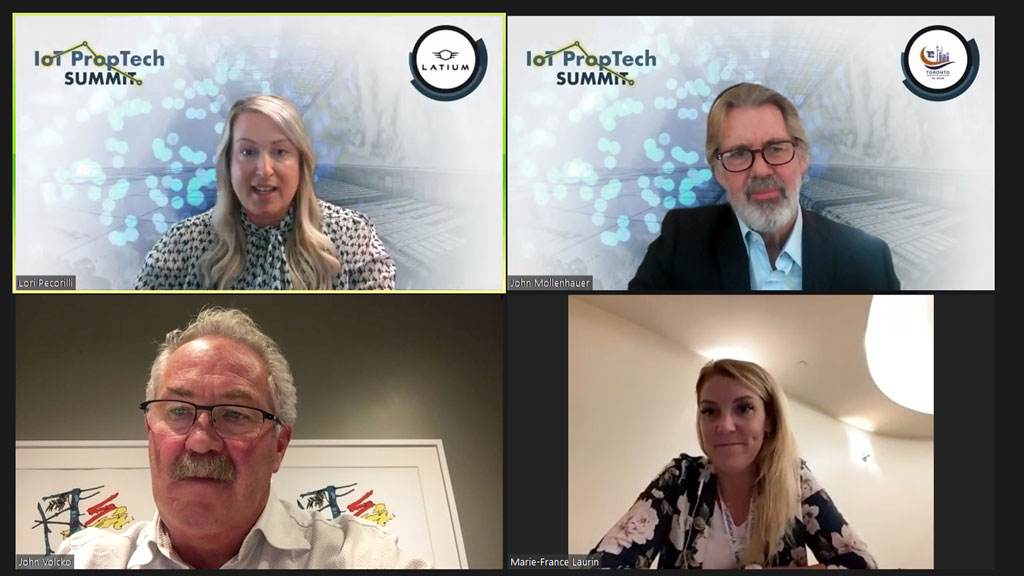More than ever before, enlightened stakeholders in the construction sector are hustling to attract top tech-savvy talent and make strategic investments in proptech as they strive to stay a step ahead of their rivals in the increasingly important smart-buildings sector.
During a Nov. 18 session of the IoT PropTech Summit, three panellists assembled for a webinar billed as A Smart Future: How Developers are Turning to Intelligent Designs.
John Mollenhauer, president and CEO of the Toronto Construction Association, served as moderator.
Panellist Lori Pecorilli, president of Alberta-based Latium Technologies, a firm active in the construction IoT sector, said construction companies are acting with urgency to make the right decisions.
“From where I sit, I’ve seen industry leaders becoming increasingly active, and they’re investing as a matter of necessity,” said Pecorilli. “They’re investing in things like tech-savvy talent to activate company-wide strategies. They’re also looking very closely at M&A, they’re looking at partnerships.”
Firms are being proactive and intentionally becoming disruptors, she said, so they don’t become victims of disruption.
“Proptech adoption will play a huge part in how these players are evolving to remain relevant,” Pecorilli added. “What I’m also seeing is industry leaders have taken such an aggressive approach, their competitors will have to follow suit, which I’ve also seen is leading to increased demand for proptech solutions across the board.”
Mollenhauer agreed: “We are flooded with information about how our assets, our buildings, can be made more intelligent, and clients or buyers of construction are beginning to understand the value of integrating intelligence, capturing data into their building.”
Property technology is generally defined as the application of technology into the real estate sector. Pecorilli and fellow panellist John Volcko, vice-president for corporate development with PCL Constructors, rhymed off lists of sensors and other applications that are becoming increasingly important as owners become aware of the need to incorporate tech into their buildings and then mine the data from that tech.
“These solutions are starting to become a necessity as the ROI is becoming very clear,” said Pecorilli. “We’ve been super busy and focused on specific construction use cases. And our lab works tirelessly at developing testing, and innovating novel technologies, such as stackable sensors, micro sensors, high-voltage cable sensors, and specific sensors…for things like smartphone applications.”
Volcko said leak detection is becoming a major field as insurance companies press to mitigate against flooding and other water damage, especially in the residential market.
“It’s really inexpensive insurance for the clients that have that long-term view,” he said of leak-detection sensors.
A third panellist, Marie-France Laurin, business development director with Stantec GenerationAV, suggested the search for the ideal proptech package should start with a discussion with the owner regarding their objectives for their building. They may want the building to be as smart as possible for lifecycle and competitive reasons and so the consultant can then discuss the connectivity that an IoT solution can give them.
“Don’t try to do everything at once. Don’t try to change everything overnight. Just make sure they’re comfortable, make sure all stakeholders are engaging in the process, that they understand what we’re doing,” she suggested.
The data mined by sensors and other technologies is increasingly valued across the board, Volcko said. Those who can collect data, synthesize it and analyze it to enhance quality of life and the quality of the built environment are further ahead in developing a smart building that becomes part of a smart city. Those who don’t bother are going to suffer in the near and long term, he said.
“Whether we’re competing for a piece of work to build a building, or our clients are competing to get a tenant, or our residential builders are competing to get purchasers and renters into their buildings, we’re all competing for something,” said Volcko.
“The sooner we can invest in the technology, get the data, analyze the data, those people that do that first are going to have a leg up and it will be a competitive advantage.”
Another advantage of injecting proptech into a building is that it becomes a stepping stone for future enhancement, Volcko said.
“Once we’re able to harness all the data, whether it’s machine learning or artificial intelligence, we will be much closer to be able to achieve smart cities on a larger scale,” he said.
“Right now, if we can get a smart building, that’s a pretty positive step forward.”



Recent Comments